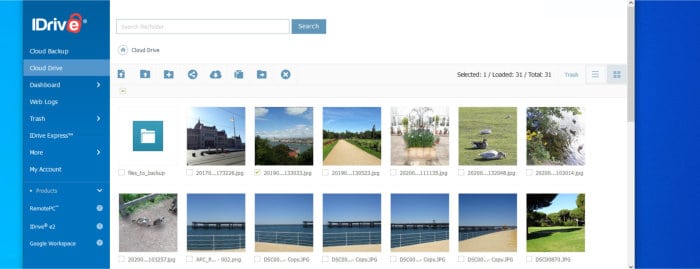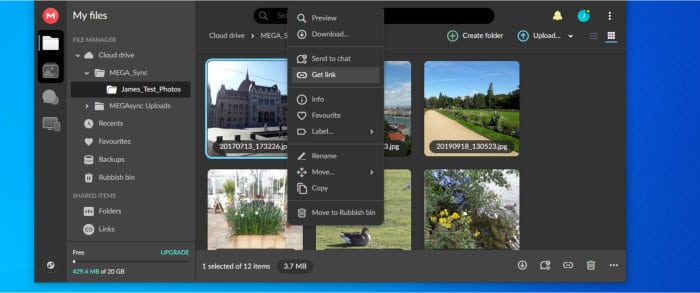Cloud storage and cloud backup are two key services which are becoming ever more common in an increasingly cloud focused world, but what is the real difference between these two similar technologies and how do you know which one is right for you?

In this guide I will be comparing cloud storage and cloud backup and explaining the key differences between the two. This includes pointing out the key pros and cons of each and how, in an interesting twist, how there is actually a lot of similarities at play between these two types of cloud service and how many can often be used for both purposes at once.
If you have been confused about the differences between these two key technologies or simply want to understand both cloud storage and cloud backup each to a deeper level, then this is the guide for you – vamos!
Are you looking for practical help and advice in choosing cloud storage? If so, then be sure to check out our various guides including our Top 10 Free Cloud Storage guide, our guide to the Best Free Cloud Storage Services plus our guide to the Best Cloud Storage for Photographers amongst several others!
File Storage vs File Backup
Before looking at how cloud storage and cloud backup services differ, we first need to look at the fundamental differences between file storage and file backup concepts!
File Storage (or as is the case here, cloud-based file storage) is simply the provision of a cloud-based storage server for the storing of files and folders upon. This means that any files and folders are stored upon the cloud service providers servers as well as, potentially, on the local device being used as well. Whilst there are some pros and cons to this type of storage over local storage, it can often can be safer and more secure thanks to the enterprise technology been used by the cloud provider for keeping said files safe and automatically backed-up.

File backup, on the other hand, is the process of not only storing any backed-up files on a separate medium to the device being backed-up (e.g., cloud storage in this instance), but also storing any historic changes to these files for a selected period of time or a set number of revisions. By storing the latest version of a file plus a log of all changes, earlier versions of any backed-up files can be recovered should they ever need to be (something which could be very useful in certain circumstances such as recovering from a malware attack or recovering an old document before certain data was removed form it etc.).
NB – There are a lot of similarities between file storage and file backup, the keeping of multiple historic versions of said files being one of the key and most important differences to take note of!
Another important difference between file storage and file backup is the access to any saved files and the integrity of such files as well. This means that, whilst any stored files (for example on a cloud storage drive) can usually be easily accessed as and when required, any backed-up files are usually stored in special archives (or containers) meaning that the backup software’s recovery tools must be used to gain access to them. By being forced to use recovery software (in many cases at least, but not all), there is less risk of any backed-up files been tampered with, becoming corrupted or being subject to unauthorised changes which could compromise their integrity (and potentially leave users with a broken file or one different to that originally backed-up).
NB – Some cloud services claim to provide “cloud backup” but do, in-fact, only keep the latest copy of any backed-up files on their cloud storage service. Whilst this is obviously better than no backup at all, a cloud backup service with at least 30-days of historic versioning available (at a minimum) should be sought for much higher levels of data protection!
How do Cloud Storage and Cloud Backup Differ?
Before looking at how these two services differ, the key thing to note between cloud storage and cloud backup is that they are both simply different applications of cloud-based storage services. This means that the real difference between these two is more about how the cloud storage is accessed and used than it is about the core cloud infrastructure which powers them both behind the scenes.
Many commercially focused cloud storage services (such as Dropbox, pCloud, Google Drive etc.) focus on providing a user-friendly front end to a cloud-based storage service. This often results in the provision of an easy-to-use web-based interface for uploading and downloading files as well as specialist desktop software which can map cloud storage as virtual drives and keep device folders automatically synchronised amongst many other related functions.
Cloud backup, on the other hand, is often more focused on providing specialist piece of desktop software which is capable of automatically keeping all important files on a device backed-up and stored upon the cloud. Whilst cloud backup and cloud storage are sometimes combined into a single service (as is seen with certain providers including pCloud and iDrive), in many cases cloud storage is a dedicated service with little to no additional cloud storage functionality available other than the core backup service itself.
Can Regular Cloud Storage be used for Backups?
Yes, whilst dedicated cloud backup services can often be very easy to use and efficient at getting a cloud-based backup in place, regular cloud storage service can (in almost all cases) also be used as a backup storage medium as well.
NB – One of the main benefits for using cloud storage as a medium for storing backups is that any data will be stored “offsite” and physically away from the device being backed-up by default. This means in an unfortunate event where your device plus any external drives or NAS devices which might have been use for backup are lost and / or destroyed, any backed-up data will remain safely stored with the cloud storage provider!
For example, various pieces of backup software (including Ashampoo Backup Pro 25, Arq 7 and Backup4all amongst many others) provider their users with the choice to make use of existing 3rd party cloud storage providers as a backup storage medium. One of the biggest benefits of this functionality is that any existing cloud storage accounts which are already being paid-for can also be utilised for storing backups on as well (meaning a separate and often dedicated cloud backup service is not needed as well).
NB – Another great benefit when using cloud storage for storing backups is that no additional hardware is needed to get started. This is in contrast to making locally stored backups which often require the purchase of an external hard drive or NAS device before becoming viable (given that it is not a good idea to store backups on the same device being backed up). Having said this, whenever possible, it is always recommended to make a locally stored backup in addition to a cloud stored backup as well!
So, Should I Choose Cloud Storage or Backup?
Everyone’s cloud-based needs will differ, but one of the key points of this guide is hopefully to show that these two services don’t necessarily need to be kept separate from one another!
For example, if you already have a cloud storage account with which you are happy with and have plenty of unused storage available, this account could also be used for making cloud backups to as well (given that the right backup software is being used and the cloud service is supported within said software). On the other hand, if typical cloud storage features including file sharing and cloud drive functionality are of less importance (or you want a quick and easy solution for making cloud backups), then dedicated cloud backup services (e.g., Backblaze or Crashplan) might be the best way to go.
Finally, for the best of both worlds, why not consider a cloud provider offering both cloud storage and cloud backup functionally from within the same plan. Some leading cloud providers including pCloud, MEGA and iDrive are good examples of providers offering such functionality and can, in many cases, also prove to be a very budget friendly way of making use of the cloud!
Cloud Storage vs Cloud Backup FAQs
Generally speaking, you should aim to have at least three different copies of any important files in at least two different locations as an absolute minimum – even if cloud storage is already making up one of these storage mediums. If the version of said files stored on the cloud are the only copies of such files, then yes, you should backup these files (by sending to another cloud storage provider or simply downloading and keeping copies locally, as best applicable).
Yes, cloud storage and online storage generally refer to the storing of data upon a service provider’s servers (i.e., the cloud). Whilst not always the case, any service advertising itself as “cloud storage” is usually accompanied with many other useful features including secure file sharing functionality, secure device backups, device synchronisation and desktop software for making the service much easier to use amongst various other features.
Yes, certain providers do offer unlimited cloud storage and / or cloud backup services. For example, <<Backblaze>> offer an unlimited amount of cloud backup (on a per device basis) with their cloud backup service and <<pCloud>> offer both unlimited cloud storage and cloud backup via their Business Pro plans.
Whether you have backup software capable of utilising 3rd party cloud storage or a dedicated cloud backup service, one of the biggest advantages of backing up to cloud storage is that this keeps a copy of your files at a physically separate location to that of the device being backed up. This offsite (cloud) backup of files provides an additional layer of safety over locally stored backup storage (e.g., external hard drives) as, in the unfortunate event of fire or theft, any important data will remain safe given that it is stored safely else ware.
When making use of a reputable cloud service provider, cloud backups will be almost certainly stored within a secure data centre upon enterprise level hardware. This means that not only is your backup protected and kept safe thanks to being stored in a separate physical location to that of your device, but specialist enterprise functionality will also be utilised by the provider to ensure that the availability and integrity of the data is also maintained.
Services Combining Cloud Storage & Backup
When it comes to comparing cloud storage vs cloud backup, if you are looking for the best of both worlds then why not check out one of several highly rated services offering both functions within a single account?
In this section I will be looking at several highly rated cloud storage services which combine a good set of cloud storage features (e.g., file sharing and device synchronisation) alongside a functioning device backup utility. Such services supporting both sets of functionalities are listed below and for each entry I have listed the key points of the service and how it functions as both a cloud storage service as well as a cloud backup utility as well.
Remember, any ratings given below reflect my own opinions and are intended only for use as a guide! Always be sure to check the details for any cloud storage or cloud backup providers before making a purchase and, if possible, always try and make full use of any free trials before making a decision!
1) pCloud
pCloud is fast becoming known as a leading cloud storage company, one which not only provides great cloud storage functionality at very reasonable prices, but also one with a great device backup utility built directly into the service itself.

pCloud really does offer a lot of cloud functionality within a single account, this includes secure file sharing, device synchronisation, public sharing pages, desktop and smartphone apps plus the ability to mount the pCloud account storage as a virtual drive within Windows. The bundling in of a backup utility which can make use of the cloud storage allocation also helps to make this offering even more appealing, especially so given that file version history is included with up to 365 days available in total (with 15 days available on the pCloud free account offering).
Other useful aspects of the pCloud service include the pCloud Crypto vault for providing zero-knowledge encrypted cloud storage, lifetime cloud accounts requiring only a single payment for continued use, smartphone apps for iOS and Android devices plus options for unlimited cloud storage on selected accounts.
pCloud is priced form just $49.99 / year for 500GB of storage with 2TB plans available for just $99.99 / year. Business orientated plans featuring up to unlimited cloud storage are also available as is a 10GB free to use account as well, more information on which can be found via the official pCloud website.
- Lifetime Plans
- Backup functionality
- AES 256-bit encryption
- 10GB free account
- From $49.99 / year
2) iDrive
iDrive is another leading cloud service combining both cloud storage and cloud backup services within a single, competitively priced and easy to use account.

Some of the key features of iDrive include secure file sharing functionality, easy to use desktop software, secure file synchronisation, disk cloning and disk image backup support plus the option to make full use of zero-knowledge encryption within the service as well. Other useful points of note include the iDrive Express recovery service which sees options for large restores to be mailed to users on external hard drives (for faster restores), multifactor authentication plus the ability to support Linux devices via special backup scripts when applicable.
The backup component within the iDrive software itself allows both file level as well as full system image backups to be made and stored upon the included cloud storage allocation. iDrive also supports full end-to-end encryption throughout the entire service as well as support for 10 historic versions of any backed-up files (by default) making this a very useful addition to the core cloud storage service.
iDrive is priced from just $2.95 / year for the Mini account featuring 100GB of cloud storage or from $69.65 / year for personal accounts providing a very generous 5TB of cloud storage with support for multiple devices. More information on all iDrive plans including business orientated offerings and the 10GB free account can be found via the official iDrive website.
- Cloud drive & backup
- Disk image backups
- AES 256-bit encryption
- 10GB Free account
- 5TB from $69.65 / year
3) MEGA (MEGA.IO)
MEGA is without doubt one of the leading privacy-focused cloud storage provides available as of today. It is a service which, amongst many other great features, includes easy-to-use desktop software with device backup functionality built in and historic file versioning turned on by default.

MEGA is a very powerful cloud storage service with many great features built-in, some of these include secure link sharing and file synchronisation, apps for iOS and Android devices, browser plugins and secure video and web chat services amongst many others. The cloud backup functionality is delivered via the MEGA desktop software which is available on Windows, MacOS and Linux devices and allows users to take advantage of up to 365 days of historic file version history by default (or 30-days on the MEGA free plans).
Security wise and MEGA is one of the relatively few cloud providers applying strong zero-knowledge end-to-end encryption across their entire cloud storage service by default. Such an application of encryption ensures all data stored upon the cloud is automatically secured as soon as it is sent to the cloud and will remain secure until downloaded again by the account holder.
MEGA is priced from just €99.99 per year for 2TB alongside other storage options totalling up to 16TB also available. More information on all MEGA plans, including the 20GB free account is available via the official MEGA website.
- Cloud backup & storage
- Secure file shairng
- iOS & Android apps
- 20GB Free account
- 2TB From €99.99 / year
Summary
As this guide hopefully shows, cloud storage and cloud backup are simply two different applications of using cloud storage infrastructure and, in many cases, can be combined to provide the best of both worlds from within a single account.
If you are seeking both traditional cloud storage services (including file sharing and device synchronisation) alongside cloud backup facilities, then why not seek a provider offering both services within a single account to help in maximising the value of you cloud investments.
Are you looking for practical help and advice in choosing cloud storage? If so, then be sure to check out our various guides including our Top 10 Free Cloud Storage guide, our guide to the Best Free Cloud Storage Services plus our guide to the Best Cloud Storage for Photographers amongst several others!



